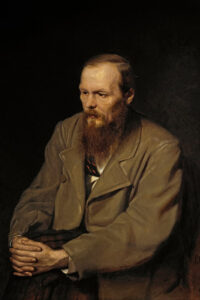
Crime and Punishment
Rodion Romanovich Raskolnikov, a former law student, lives in extreme poverty in a tiny, rented room in Saint Petersburg. Isolated and antisocial, he has abandoned all attempts to support himself and is brooding obsessively on a scheme he has devised to murder and rob an elderly pawnbroker. On the pretext of pawning a watch, he visits her apartment but cannot commit himself.
Later, in a tavern, he makes the acquaintance of Semyon Zakharovich Marmeladov, a drunkard who recently squandered his family’s little wealth. Marmeladov tells him about his teenage daughter, Sonya, who has become a prostitute to support the family. The next day, Raskolnikov receives a letter from his mother describing the problems of his sister Dunya, who has been working as a governess with her ill-intentioned employer, Svidrigailov. To escape her vulnerable position, and with hopes of helping her brother, Dunya has chosen to marry a wealthy suitor, Luzhin, whom they are coming to meet in Petersburg. Details in the letter suggest that Luzhin is a conceited opportunist seeking to take advantage of Dunya’s situation.
Raskolnikov is enraged at his sister’s sacrifice, feeling it is the same as what Sonya felt compelled to do. Painfully aware of his poverty and impotence, his thoughts return to his idea. A further series of internal and external events seem to conspire to compel him toward the resolution to enact it. In extreme nervous tension, Raskolnikov steals an axe and goes to the old woman’s apartment. He gains access by pretending he has something to pawn and then attacks her with the axe, killing her. He also destroys her half-sister, Lizaveta, who happens to stumble upon the crime scene. Shaken by his actions, he steals only a handful of items and a small purse, leaving much of the pawnbroker’s wealth untouched. Due to sheer good fortune, he manages to escape the building and return to his room undetected.
Read or download Book
Fyodor Dostoevsky
Fyodor Mikhailovich Dostoevsky (11 November 1821 – 9 February 1881), sometimes transliterated as Dostoyevsky, was a Russian novelist, short story writer, essayist and journalist.
Biography.
Numerous literary critics regard him as one of the greatest novelists in world literature, as many of his works are considered highly influential masterpieces. Dostoevsky’s literary works explore the human condition in the troubled political, social, and spiritual atmospheres of 19th-century Russia and engage with various philosophical and religious themes. His most acclaimed novels include Crime and Punishment (1866), The Idiot (1869), Demons (1872), and The Brothers Karamazov (1880). His 1864 novella Notes from Underground is considered one of the first works of existentialist literature.
Born in Moscow in 1821, Dostoevsky was introduced to literature early through fairy tales, legends, and books by Russian and foreign authors. His mother died in 1837 when he was 15, and around the same time, he left school to enter the Mykolaiv Military Engineering Institute. After graduating, he worked as an engineer and briefly enjoyed a lavish lifestyle, translating books to earn extra money. In the mid-1840s, he wrote his first novel, Poor Folk, which gained him entry into Saint Petersburg’s literary circles. However, he was arrested in 1849 for belonging to an academic group, the Petrashevsky Circle, that discussed banned books critical of Tsarist Russia. Dostoevsky was sentenced to death, but the sentence was commuted at the last moment. He spent four years in a Siberian prison camp and six years of compulsory military service in exile.
In the following years, Dostoevsky worked as a journalist, publishing and editing several magazines of his own and later A Writer’s Diary, a collection of his writings. He began to travel around western Europe and developed a gambling addiction, which led to financial hardship. He had to beg for money for a time but eventually became one of the most widely read and highly regarded Russian writers. Dostoevsky’s work consists of thirteen novels, three novellas, seventeen short stories, and numerous others. His writings were widely read both within and beyond his native Russia. They influenced several later writers, including Russians such as Aleksandr Solzhenitsyn and Anton Chekhov, philosophers Friedrich Nietzsche and Jean-Paul Sartre, and the emergence of Existentialism and Freudianism. His books have been translated into more than 170 languages and served as the inspiration for many films.






